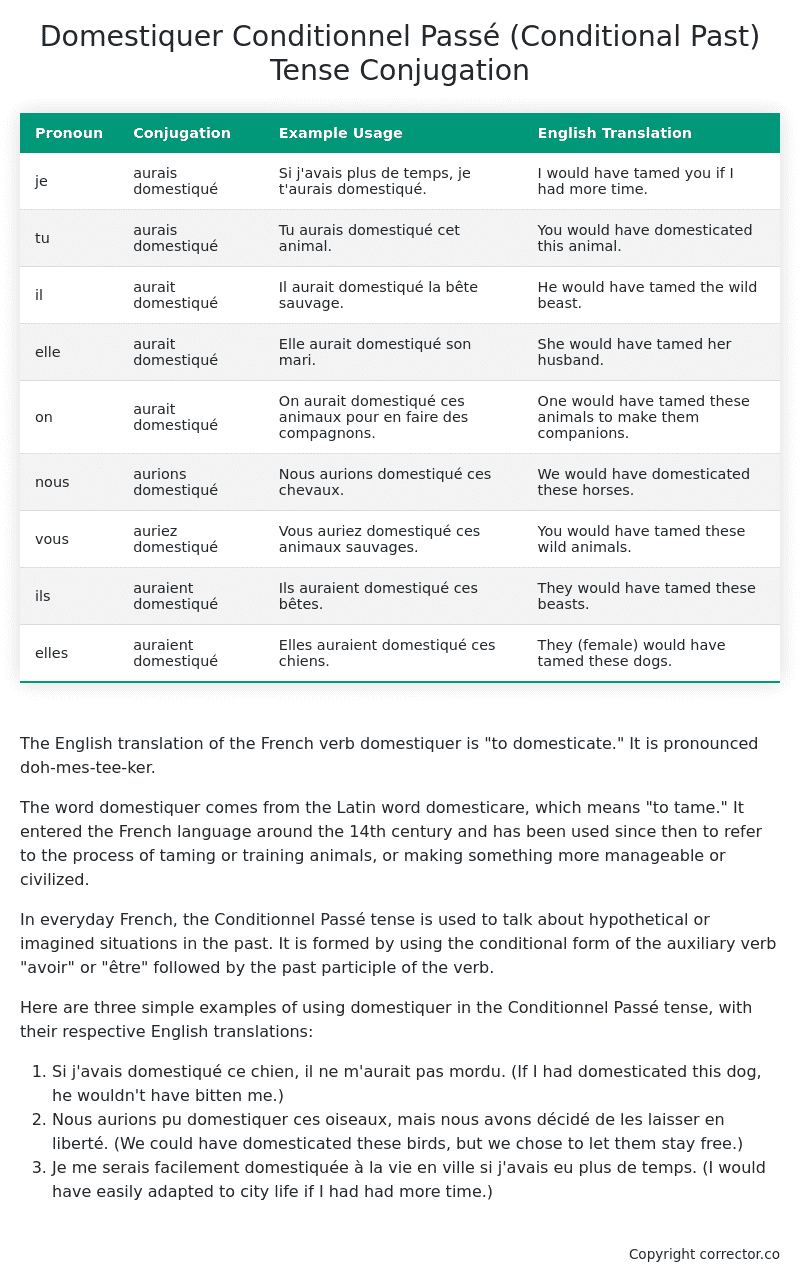Conditionnel Passé (Conditional Past) Tense Conjugation of the French Verb domestiquer
Introduction to the verb domestiquer
The English translation of the French verb domestiquer is “to domesticate.” It is pronounced doh-mes-tee-ker.
The word domestiquer comes from the Latin word domesticare, which means “to tame.” It entered the French language around the 14th century and has been used since then to refer to the process of taming or training animals, or making something more manageable or civilized.
In everyday French, the Conditionnel Passé tense is used to talk about hypothetical or imagined situations in the past. It is formed by using the conditional form of the auxiliary verb “avoir” or “être” followed by the past participle of the verb.
Here are three simple examples of using domestiquer in the Conditionnel Passé tense, with their respective English translations:
- Si j’avais domestiqué ce chien, il ne m’aurait pas mordu. (If I had domesticated this dog, he wouldn’t have bitten me.)
- Nous aurions pu domestiquer ces oiseaux, mais nous avons décidé de les laisser en liberté. (We could have domesticated these birds, but we chose to let them stay free.)
- Je me serais facilement domestiquée à la vie en ville si j’avais eu plus de temps. (I would have easily adapted to city life if I had had more time.)
Table of the Conditionnel Passé (Conditional Past) Tense Conjugation of domestiquer
| Pronoun | Conjugation | Example Usage | English Translation |
|---|---|---|---|
| je | aurais domestiqué | Si j’avais plus de temps, je t’aurais domestiqué. | I would have tamed you if I had more time. |
| tu | aurais domestiqué | Tu aurais domestiqué cet animal. | You would have domesticated this animal. |
| il | aurait domestiqué | Il aurait domestiqué la bête sauvage. | He would have tamed the wild beast. |
| elle | aurait domestiqué | Elle aurait domestiqué son mari. | She would have tamed her husband. |
| on | aurait domestiqué | On aurait domestiqué ces animaux pour en faire des compagnons. | One would have tamed these animals to make them companions. |
| nous | aurions domestiqué | Nous aurions domestiqué ces chevaux. | We would have domesticated these horses. |
| vous | auriez domestiqué | Vous auriez domestiqué ces animaux sauvages. | You would have tamed these wild animals. |
| ils | auraient domestiqué | Ils auraient domestiqué ces bêtes. | They would have tamed these beasts. |
| elles | auraient domestiqué | Elles auraient domestiqué ces chiens. | They (female) would have tamed these dogs. |
Other Conjugations for Domestiquer.
Le Present (Present Tense) Conjugation of the French Verb domestiquer
Imparfait (Imperfect) Tense Conjugation of the French Verb domestiquer
Passé Simple (Simple Past) Tense Conjugation of the French Verb domestiquer
Passé Composé (Present Perfect) Tense Conjugation of the French Verb domestiquer
Futur Simple (Simple Future) Tense Conjugation of the French Verb domestiquer
Futur Proche (Near Future) Tense Conjugation of the French Verb domestiquer
Plus-que-parfait (Pluperfect) Tense Conjugation of the French Verb domestiquer
Passé Antérieur (Past Anterior) Tense Conjugation of the French Verb domestiquer
Futur Antérieur (Future Anterior) Tense Conjugation of the French Verb domestiquer
Subjonctif Présent (Subjunctive Present) Tense Conjugation of the French Verb domestiquer
Subjonctif Passé (Subjunctive Past) Tense Conjugation of the French Verb domestiquer
Subjonctif Imparfait (Subjunctive Imperfect) Tense Conjugation of the French Verb domestiquer
Conditionnel Présent (Conditional Present) Tense Conjugation of the French Verb domestiquer
Conditionnel Passé (Conditional Past) Tense Conjugation of the French Verb domestiquer (this article)
L’impératif Présent (Imperative Present) Tense Conjugation of the French Verb domestiquer
L’infinitif Présent (Infinitive Present) Tense Conjugation of the French Verb domestiquer
Struggling with French verbs or the language in general? Why not use our free French Grammar Checker – no registration required!
Get a FREE Download Study Sheet of this Conjugation 🔥
Simply right click the image below, click “save image” and get your free reference for the domestiquer Conditionnel Passé tense conjugation!

Domestiquer – About the French Conditionnel Passé (Conditional Past) Tense
Formation
Common Everyday Usage Patterns
Expressing Unreal Past Scenarios
Polite Requests or Suggestions
Expressing Doubt or Uncertainty
Interactions with Other Tenses
Conditional Present
Indicative Past Tenses
Conditional Future
Summary
Want More?
I hope you enjoyed this article on the verb domestiquer. Still in a learning mood? Check out another TOTALLY random French verb conjugation!


